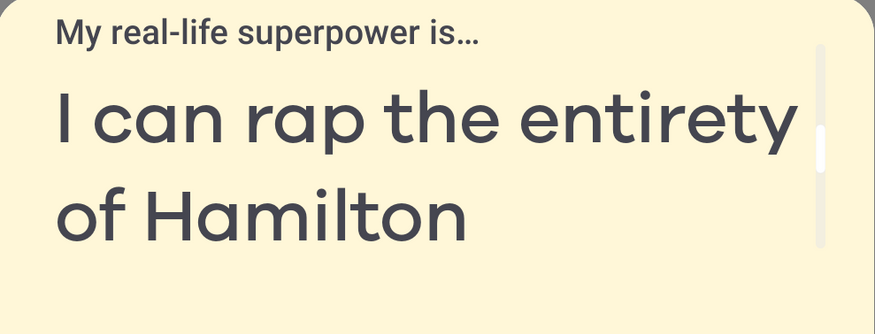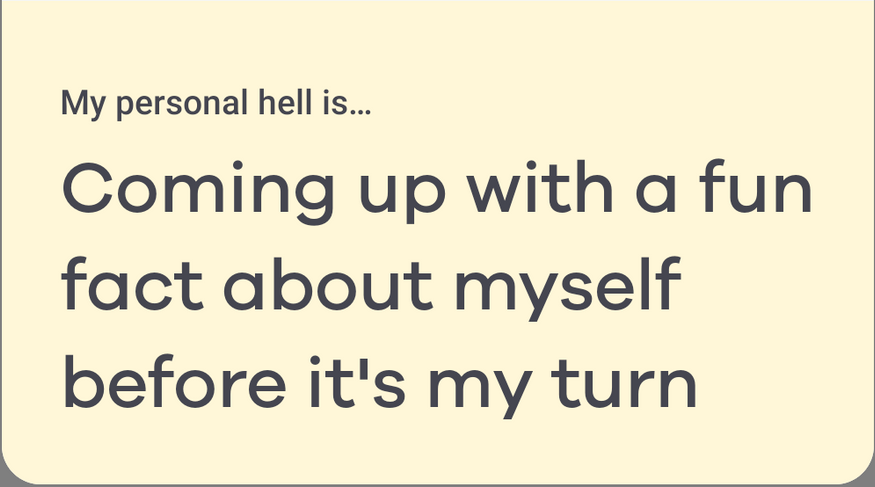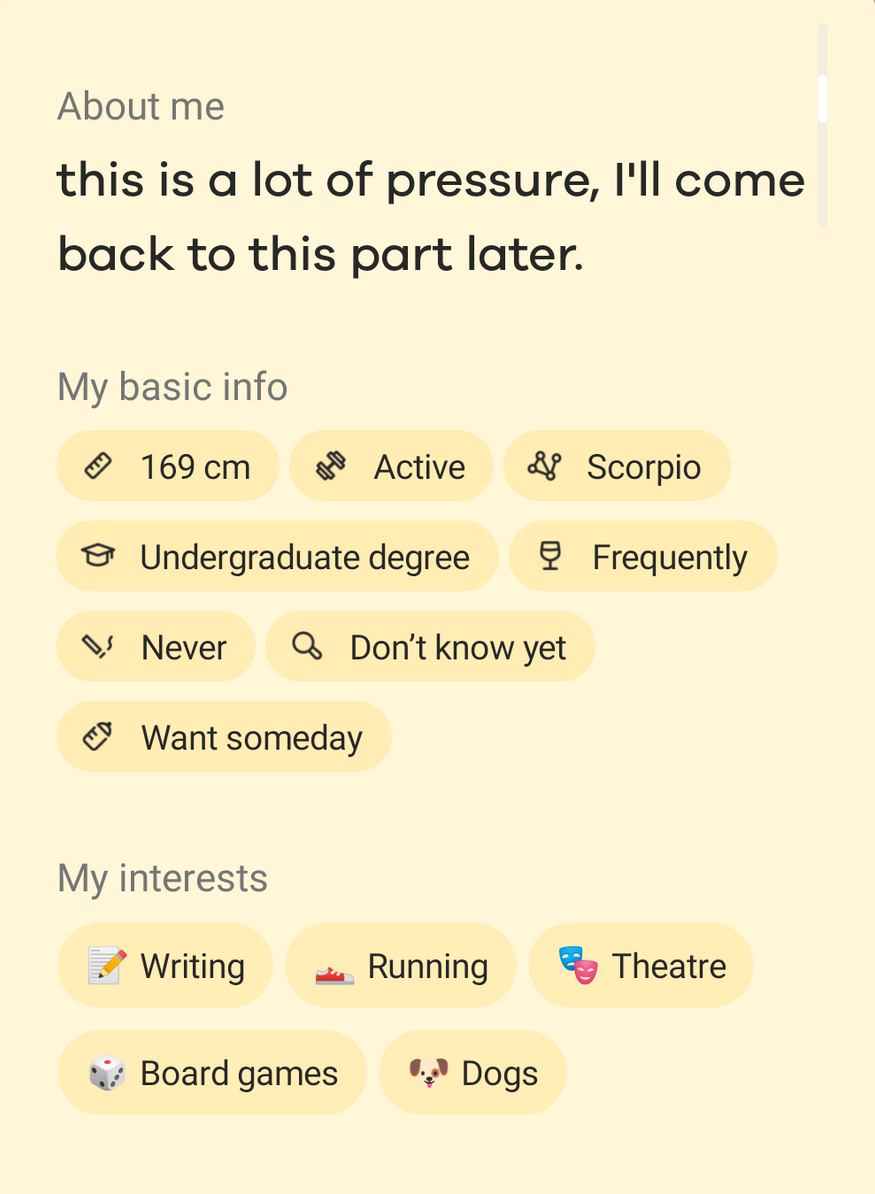Should I Disclose My Mental Illness on Dating Apps?
Published on 7/26/2021I have recently entered the excruciating world of dating apps. My long-term relationship ended, and I have no clue how you even meet people nowadays. I’m not really a social butterfly, and even if I was, clubs and festivals are still on hold where I live, so it seemed like dating apps could be the way forward. For years, my friends have been telling me about their dating app escapades. I have been enlisted to help refine bios, weed out potential weirdos and even drunkenly swipe for them one time - what a high!
So I downloaded Happn, and when that didn’t bring the fireworks I had hoped for, I added Bumble to my phone. I spent the necessary time swiping and looking at countless profiles, and I tried to reply to messages even though it felt like a trip to the dentist. But in making a profile designed to highlight the best of me - including tactfully chosen photos that are both realistic but ambitious- it started to feel more and more like catfishing. This was all good and well for a one-night hookup, but if things were ever going to progress, wouldn’t they need to know the truth about me? And the truth about me includes a mental illness, so maybe I should be ripping off the bandaid sooner rather than later.

The things we share (and don’t)
One of the things that bothered me most about the app Happn (I just noticed the pun in the name, that is really smart!) was that the majority of people didn’t write a description at all. They’d either leave it blank, letting their photos speak for them, or write some one-liner they presumed to be witty. In contrast, I had spent about twenty minutes crafting a description I felt could capture the essence of who I am. I wanted to stand out, or maybe just to prepare them for what I’m really like. This is why Bumble was recommended to me, as on this app, you’re asked to fill in three questions of your choosing, and individuals can see your answers. This not only gives you an insight into the individual as well as a great entrance into a conversation.
But how much do these answers really share about us, given that we chose the questions? That right there is a significant bias. We’re choosing the side of ourselves that we introduce, in a way that you can’t in real life, where a first impression is what you actually get. If you can choose your first impression, is it really an impression of who you are or who you wish to be?

I’ve seen people share their hobbies, music taste, job, nationality, and everything else that can sit tidily in a line or two. But those things seem pretty minor when you consider everything that goes into a romantic relationship. It feels more important for you to know my daily struggle rather than the fact that I’m in the top 0.01% of Taylor Swift listeners and can drunkenly recite the entirety of Hamilton - although those might be strong clues. So many of these profiles are labelled as looking for something serious, and yet they’re entering into it with the most superficial layer of themselves.
I don’t want to know the things you’d tell a colleague about yourself. I want to know what makes you laugh so hard you snort. The thoughts you struggle to shake and would one day wish to share with me. The film that makes you cry and why you think that is. The traits you consider flaws that I need to love you for, not despite. I want to know who you are, and that comes with the good, the bad and the ugly. My ugly would be my personality disorder, as it wreaks havoc on so many aspects of my life.
Interpersonal relationships
I never had to tell my ex about my personality disorder, as he was there to witness it for himself, and he was there when I got diagnosed. At the start, I had to open up about my experiences with depression and anxiety, although it wasn’t much of a surprise by then. Everything else became apparent quickly because a personality disorder like mine is ever-present in interpersonal relationships.
Borderline Personality Disorder (BPD) gives you an intense fear of abandonment, one that drives deep into your gut and transforms everything into an attack. It makes you run from your partner but also cling to them; it makes you jealous but also aloof. BPD gives you an unstable sense of self, so you use your partner to explain yourself; you constantly change and adapt to people, also to try and keep them. It comes with self-sabotaging behaviours that also serve to hurt everyone around you. My BPD is relevant because they’ll experience it for themselves, so I’d almost prefer if they knew straight away what it was. Because every other trait I list on such an app stems from it in one way or another. Even if I were to go on one casual date with someone, the effects of my BPD would already be stirring, and wouldn’t it be worse to share it then?
I can’t separate my BPD from who I am, particularly when it comes to romantic or sexual encounters. To leave it from my profile feels like a gaping hole, a missing puzzle piece, a barely covered lie.
Filter people out
I listened to a podcast recently where they remarked that people have started listing their mental illness on their social media profiles. I haven’t seen this often, so I was surprised to hear them discuss it. They considered it to be a grab for attention or a way of turning your mental illness into your identity. I understood where they were coming from, but then I tried to think of it from a different direction.
Because you’re not turning your mental illness into your identity, it’s already a part of it. You’re not defined by your mental illness, but it does help to explain who you are and why you do certain things. It’s like a manual to your worst behaviours and fears. Perhaps sharing your mental illness on platforms is a way of filtering out the people who can’t take it, who hear such terms and run. There are people who have undermined my diagnosis, who haven’t believed it, or who have promptly left my life when they heard those three little letters.
That’s okay. We all have our own battles and struggles, and this is mine, that is theirs. I almost prefer having it done sooner than later before I get attached, as I undoubtedly will. By sharing your diagnosis right away, you’re ensuring that everyone who proceeds from that point is aware of it, is acknowledging it and continuing down the path of getting to know you.

When do you tell someone?
If not right away, when do you tell someone about your mental illness? Maybe you tell them on the first date when you’re meeting face to face. But first dates are stressful enough, and there is so much pressure. Maybe you wait until you’re intimate when the effects of it are already working away. Maybe you wait until you’re exclusive or whatever the equivalent of that is for you, when they’re dedicated to you. But by then, they’ve signed up for something without knowing the Terms & Conditions, which doesn’t feel right. Do you wait until they see the effects of it for themselves? When you break down over something minor, when you panic that they’re not responding to you, when they see the scars on your skin, is that when you tell them?
There is no right way to tell them, nor a suitable time. I don’t know if the solution is to blast it across dating apps and social media profiles, but I do understand why someone would be tempted to do this. I guess you can go in hoping it will come up whilst knowing those sorts of things never really do. The most natural conversation would either be them dismissing mental health struggles or having the bravery to share their own, so do you spend every date waiting for that moment?
I don’t plan to add my diagnosis to my dating profile because I’m still living in a world where BPD is a scary thing that people don’t understand. Where I’d be presumed to be showing off my label rather than informing them of it. I don’t really know the protocol for casual dating with a mental illness, but I guess I’ll find it out through trial and error. Maybe next time you hear from me, I’ll be telling you exactly how you share your mental illness with new partners. Or better yet, you can let me know how you do it in the comment section.
Looking for more content about dating apps? Find out which dating app each Sex and the City character would use.
Featured posts

Fleur
Welcome to Symptoms of Living! A place where I like to relieve myself of the barrage of thoughts and ideas filling my mind. Here I'll take a look at various topics, from books to BPD, series to self-harm, there's nothing that we can't, and shouldn't, talk about.
Having struggled with mental illness since the age of 15, one of the hardest parts was how alone I felt in it. While mental illness is beginning to be discussed more openly, and featured in the media, I still think there is room for improvement. So whether it is mental illness or merely mental health, a bad day or a bad year, let's make this a place to approach it and strip it back. Everyone has their own symptoms of living, and you certainly won't be the only one with it.
Would you like to receive my top monthly articles right to your inbox?
For any comments/questions/enquiries, please get in touch at:
info@byfleurine.com
I'd love to hear from you!